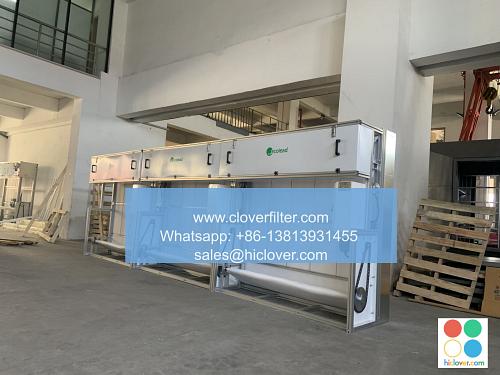Air Filters in Biomedical Applications

Air filters play a vital role in maintaining clean and sterile environments in biomedical applications, including hospitals, laboratories, and pharmaceutical manufacturing facilities. The use of high-quality air filters is essential to prevent the spread of airborne pathogens, reduce contamination, and ensure the quality of medical products. In this article, we will highlight the importance of air filters in biomedical applications, discuss various types of air filters, and explore their applications in different fields.
Types of Air Filters Used in Biomedical Applications
Several types of air filters are used in biomedical applications, including HEPA (High Efficiency Particulate Air) filters, ULPA (Ultra Low Penetration Air) filters, and activated carbon filters. HEPA filters are designed to capture 99.97% of particles as small as 0.3 microns, making them ideal for use in hospitals, laboratories, and other areas where sterile environments are required. ULPA filters, on the other hand, can capture particles as small as 0.12 microns, making them suitable for use in pharmaceutical manufacturing and other applications where ultra-clean environments are necessary.
Applications of Air Filters in Biomedical Research
Air filters are used in various biomedical research applications, including cell culture, microbiology, and molecular biology. In cell culture, air filters are used to maintain a sterile environment and prevent contamination of cell lines. In microbiology, air filters are used to prevent the spread of airborne pathogens and maintain a clean environment for culturing microorganisms. In molecular biology, air filters are used to prevent contamination of DNA and RNA samples and maintain a clean environment for PCR (Polymerase Chain Reaction) and other sensitive techniques.
Air Filters in Hospital Environments
Air filters are critical components of hospital environments, where they are used to prevent the spread of airborne pathogens and maintain a clean and sterile environment for patients. In operating rooms, air filters are used to maintain a sterile environment and prevent surgical site infections. In patient rooms, air filters are used to reduce the spread of airborne pathogens and improve indoor air quality. Air filters are also used in hospital laboratories, where they are used to maintain a clean environment for testing and analysis.
Air Filters in Pharmaceutical Manufacturing
Air filters are used in pharmaceutical manufacturing to maintain a clean and sterile environment for the production of medical products. In pharmaceutical manufacturing facilities, air filters are used to prevent contamination of raw materials, intermediates, and finished products. Air filters are also used to maintain a clean environment for packaging and labeling of medical products.
Importance of Air Filter Maintenance
Regular maintenance of air filters is critical to ensure their effectiveness in maintaining clean and sterile environments. Air filters should be replaced regularly to prevent clogging and reduce airflow. Additionally, air filters should be cleaned and disinfected regularly to prevent the growth of microorganisms. Proper maintenance of air filters can help prevent contamination, reduce the risk of airborne infections, and improve indoor air quality.
Future Directions for Air Filters in Biomedical Applications
The use of air filters in biomedical applications is expected to continue to evolve in the future, with the development of new technologies and innovations. Some potential future directions for air filters in biomedical applications include the use of nanotechnology, antimicrobial coatings, and smart sensors to monitor and control air quality. Additionally, the development of more efficient and effective air filters could lead to improved indoor air quality and reduced energy consumption in biomedical facilities.
In conclusion, air filters play a critical role in maintaining clean and sterile environments in biomedical applications. The use of high-quality air filters is essential to prevent contamination, reduce the spread of airborne pathogens, and ensure the quality of medical products. By highlighting the importance of air filters in biomedical applications and exploring their applications in different fields, we can appreciate the critical role that air filters play in maintaining public health and safety. You haven’t provided a question or topic for me to respond to. Please provide more context or information so I can assist you. What would you like to talk about or ask?

